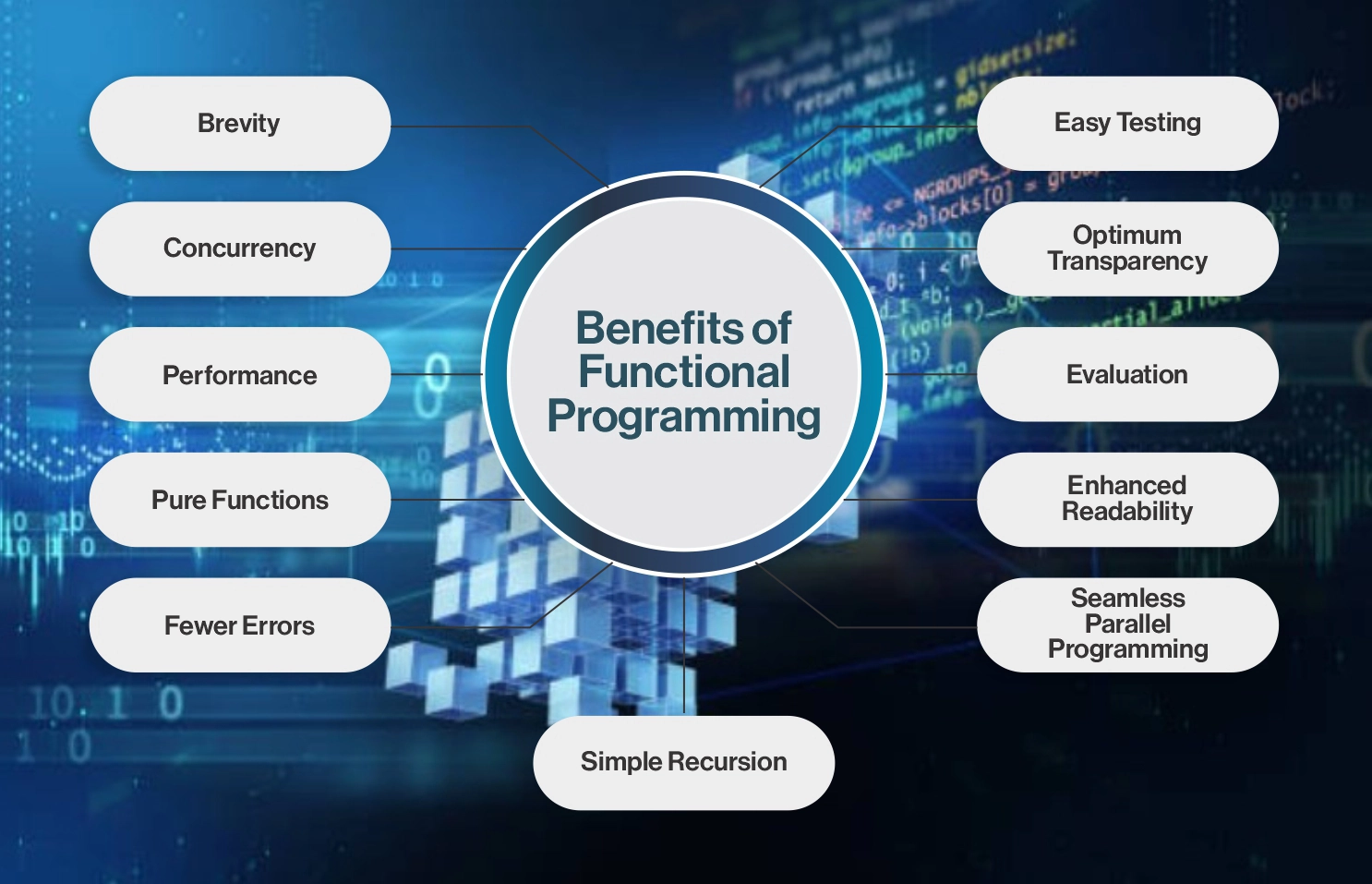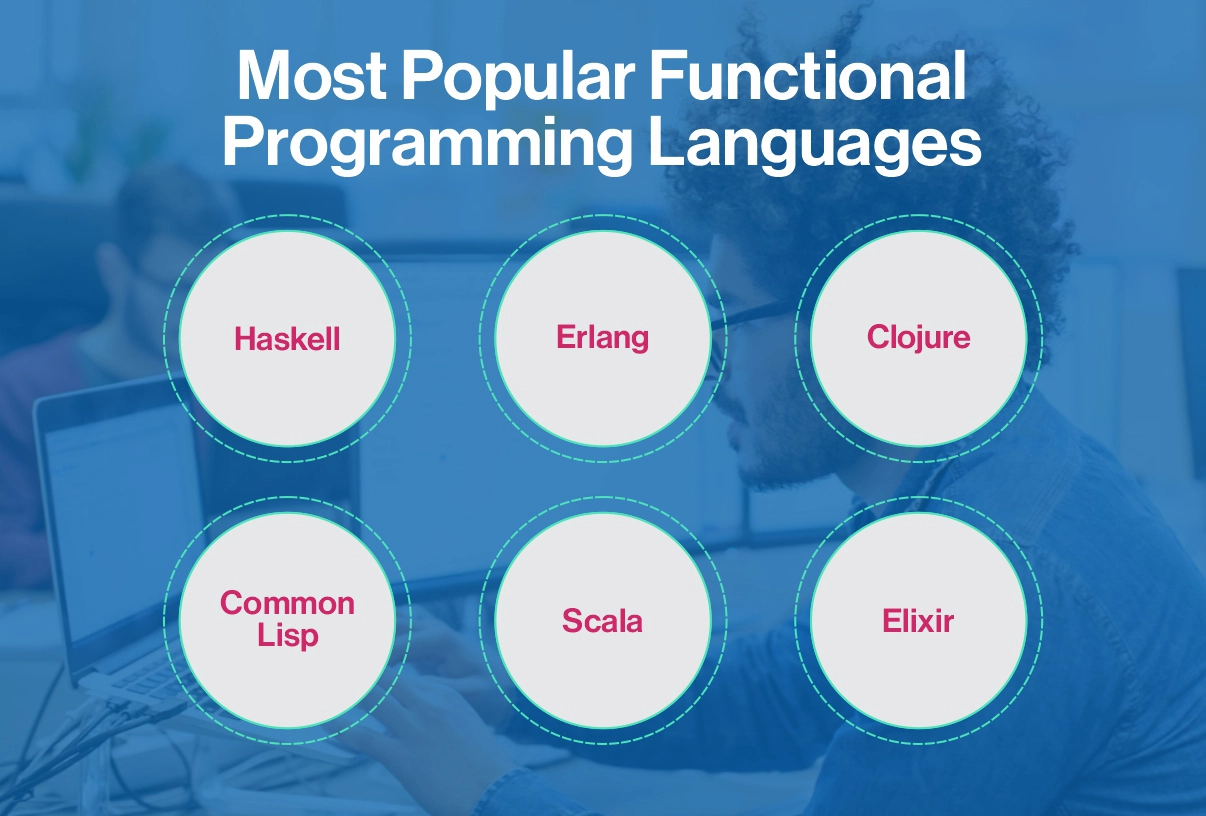The demands of the digital world are increasing every day. Software companies and, more precisely, developer communities are trying to make use of technology stacks that seamlessly solve real-world problems. Software developers employ various functional programming languages and styles depending on which is a better fit for the solution required.
Also, the best software outsourcing companies also employ functional programming to provide the best services.
In this article, we will look at the role and benefits of functional programming. So, let’s get started!
What is Functional Programming?
Functional programming is a way of writing code that strictly binds the programs through functions. It is a function-oriented approach in which the code is written purely in mathematical functions. It follows a declarative programming style that considers the aspect of solving problems rather than the method of solving them. The mathematical expressions take some form of input from the user, process it through written code, and give output.
The concept of functional programming is based on describing what you want to do. You do not write any complex code in which a for-loop keeps on iterating the variables. It does not tangle multiple variables that are highly dependent on the results of some functions.
The ultimate purpose of using functional programming is to make code clear to yourself and define functions for each process that is part of your problem. Once the functions are defined, they are connected to create a collective solution.
Some developers try to map functional programming in Python and other programming languages. Haskell, F#, Elixir, Clojure, Racket, Common Lisp, OCaml, Scheme, and Scala are some pure functional programming languages.
Why Functional Programming is Important?
Functional programming (FP) has seen a rise in adoption due to its compatibility with big data and machine learning. Its ability to parallelize pure functions efficiently stands out. FP simplifies data analysis workflows and tasks, enhancing their analysis, testing, and maintenance.
Given its inherent purity, FP excels in processing extensive datasets and in machine learning applications. Pure functions yield consistent results, unaffected by external values, aiding in error identification and correction, and simplifying debugging for programmers.
John Hughes' paper from the University of Glasgow emphasizes FP's crucial role in future tech development due to its modularity. Modularity breaks down complex projects into manageable modules, enabling separate testing and reducing the time spent on unit testing and debugging.
Benefits of Functional Programming
There are various advantages of functional programming languages. That is why it’s widely used in IT outsourcing services. Some potential benefits are:

Brevity
This is one of the biggest benefits of functional programming. Brevity focuses on keeping the code very concise. The program written on the concepts of functional programming does not involve any complex methods. For instance, it does not keep on iterating the variables in a loop for long. The overhead of complexity is, therefore, not an issue in functional programming.
Concurrency
Concurrency in code is easy to achieve with functional programming. The code written in the form of functions eliminates the excessive work for the compiler. Most of the operations/functions written are handled by the compiler in an efficient way. Once the code is consistent in its nature, it makes readability and comprehension easier for the programmer. Consistency is also useful when it comes to making changes in the code in the future.
Pure functions inherently exhibit thread safety, ensuring multiple concurrent processes won't access shared data simultaneously, preventing race conditions—challenging bugs to identify and resolve. As pure functions don't share state across program sections, they eliminate the possibility of race conditions.
Consider the earlier code:
var radius = 2.0
func areaOfCircle() float64 {
return 3.14 * radius * radius
}
If two distinct threads access the ‘areaOfCircle’ function concurrently, modifying the ‘radius’ value, conflicts may arise. Altering the ‘radius’ value in one thread could inadvertently impact the other, leading to unpredictable output between threads.
Performance
Functional programming is serviceable from the performance point of view. From the context of a single processor, functional programming languages ensure enhanced performance. It mitigates the lazy evaluation and compilation of the code. Moreover, when more extensions are integrated into the compiler, it does not affect the performance of the program. This means that for highly scalable projects, functional programming works really well.
Pure Functions
One of the major points of concentration in functional programming is that it is based on pure functions. These pure functions tend to focus individually on a particular functionality or system feature. When a function is totally dependent on the input, it becomes easy to understand the program's state.
The function signatures give out the return type and the arguments. The benefit of pure functions also ensures enhanced consistency within the code. The reason is pure functions avoid changing the variables and data outside the code; therefore, implementing concurrency becomes more effective.
Pure functions consistently yield the same output without external influences, simplifying debugging in functional programming algorithms.
While most functional programming languages offer this advantage, Haskell notably distinguishes between pure and impure functions. Similarly, Scala is recognized for integrating features aligning with functional programming principles.
Pure functions mirror a mathematical approach, ensuring predictability. Just as inputting 2+2 into a calculator consistently results in 4, pure functions deliver reliable and uncontaminated outcomes, maintaining the essence of functional programming.
Fewer Errors
Functional programming is less prone to errors or bugs in code. The code follows a consistent approach in the form of pure functions. Each function is associated with some purpose and an output value. This structured way of writing code reduces the risks of errors during compilation. Moreover, even if there are errors in functional programming, debugging is easier to do.
The reason is that it depends on the input parameters that produce outputs accordingly; it becomes easy to debug the errors as you track the piece of code that is giving errors by studying output in a part of the program.
Simple Recursion
Functional programming language involves simple recursion. There are immutable variables that have fewer side effects. The concept of lazy evaluation is followed here in which the value of the variable is stored only when it is required. There is no hidden output that ultimately makes recursion very simple.
Easy Testing
As the code is written in pure function form, there is no hidden argument and output. Therefore, the testing phase becomes simple for the programmers. The testing techniques, such as property-based testing, make the phase even easier. With fewer bugs and easy debugging, QA for functional programming is not hard.
Optimum Transparency
The use of pure functions in functional programming ensures remarkable transparency. The clear distinction between pure and impure functions in these languages significantly elevates program transparency.
Pure functions solely operate with user inputs, unlike object-oriented programs that frequently involve additional inputs and produce outputs unrelated to the user’s input.
In functional programming, algorithms work exclusively with the user-provided data, devoid of any intermediary elements. As a result, the output directly correlates with the input, eliminating any concealed or 'hidden' aspects in the process.
Evaluation
Evaluation is one of the pivotal benefits of functional programming, as it stores values only when necessary. This approach involves a meticulous assessment before storing a value, preventing redundant evaluations of the functional program's inputs.
Haskell epitomizes this concept through its foundation in "lazy evaluation." This principle allows users to revisit a data structure if it remains free of dependencies. It discards temporary computations, significantly reducing the algorithms' time complexity.
Enhanced Readability
Functional programming offers improved readability of values, extending beyond the advantages of state changes. Pure values enhance program readability, simplifying comprehension for developers.
Since most functional programming languages are considered 'high-level,' treating each function as a value enables users to better memorize and utilize these functional program values in other functions. This characteristic foster easier code comprehension and utilization.
Seamless Parallel Programming
Functional programming excels in facilitating seamless parallel programming. The static use of variables in functional languages is key to this capability. Pure functions, which abstain from altering variables and solely operate based on user inputs, simplify managing parallelism. This approach significantly reduces the error scope and enhances overall efficiency in parallel applications, a prominent advantage embraced by developers, especially in languages like Scala.
Also, read our guide: waterfall model in software engineering
Most Popular Functional Programming Languages

Haskell
Haskell stands out as a general-purpose, purely functional programming language. In this domain, every function is akin to a pure function in the mathematical context. There are no statements or instructions; instead, the language operates solely on expressions that cannot alter local or global variables or access any form of state, such as random numbers or time.
Erlang
Erlang, often referred to as Erlang/OTP is a versatile, functional, and concurrent programming language. It specializes in constructing scalable, soft, real-time systems that prioritize high availability. Its applications span various industries, including eCommerce, computer telephony, and instant messaging, due to its robust capabilities.
Clojure
Clojure is a dynamic and functional programming language, a dialect of Lisp designed for the Java platform. It unites the structured environment of Lisp with the interactive and flexible nature of a scripting language. Clojure particularly shines in multithreaded programming, offering robust support for concurrent tasks.
Common Lisp
Common Lisp is a mature member of the Lisp programming language family. ANSI standardizes it and supports multiple programming paradigms, including functional, procedural, and object-oriented styles. Common Lisp boasts a powerful macro system, empowering developers to customize the language to meet the specific needs of their applications.
Scala
Scala is a versatile programming language that harmonizes Object-Oriented Programming (OOP) and Functional Programming (FP). Its static typing feature prevents bugs in intricate applications, and its compatibility with JavaScript and JVM runtimes facilitates the creation of dynamic systems backed by extensive libraries.
Elixir
Elixir is a versatile and functional programming language designed for creating scalable, maintainable applications. Leveraging the Erlang VM enables the operation of fault-tolerant, low-latency, and distributed systems. Elixir finds extensive applications across embedded software, web development, multimedia processing, and other domains.
Versatility of Functional Programming
Functional programming finds applications across various domains:

Web Development
Functional programming (FP) plays a significant role in developing web applications, especially those that need to handle a lot of users and perform swiftly. Widely known web tools like React, Angular, and Vue are designed with functional programming ideas to create responsive and scalable websites. Web development is one of the main services provided by software project development companies. If you aim to build web applications demanding instant processing and handling multiple tasks simultaneously, languages like Elixir and Haskell, known for functional programming, can be your go-to choices.
Data Processing
Data processing and analysis greatly benefit from languages that incorporate functional aspects, like Python and R. Tech outsourcing companies employ these languages when dealing with massive datasets, ensuring efficient and effective data analysis and processing.
Gaming
Functional programming finds its place in gaming, handling intricate game logic and crafting game engines and simulation software. Notably, Lisp, a functional programming language, has played a pivotal role in creating beloved video games like the Civilization series.
Financial Application
Functional programming languages like OCaml and Haskell find significant applications in the financial sector, delivering accuracy, reliability, and speed essential for financial applications.
AI & ML
Functional programming concepts, observed in libraries like TensorFlow and PyTorch, have implications in artificial intelligence (AI) and machine learning (ML) applications. These languages aid in implementing structures like decision trees and neural networks, enhancing the functionality of systems in these domains.
Learn how outsourced teams can leverage functional programming better.In-House Vs Outsourcing Software Development
Is Functional Programming the Future?
Functional programming has become a paradigm emphasizing computation through mathematical functions rather than altering program states through imperative statements. This approach boasts benefits like code clarity, enhanced testability, debug-friendliness, and efficient parallelization and distribution of tasks.
Is it the future of programming? While many advocates believe so, it's essential to acknowledge that no single paradigm is universally perfect. Different tasks require different approaches. Functional programming's scalability and ease of maintenance in large codebases are notable advantages in today's complex software systems.
Yet, functional programming won't entirely supplant other paradigms. Instead, it's likely to coexist and complement diverse programming methodologies. Some enthusiasts humorously tag themselves as "functional fanatics," playfully teasing traditional programming practices as "imperative," adding a light-hearted touch to the debate.
The growing affinity for functional programming reflects its potential to shape the future of computer science. It also shows how much it can add to SaaS product development benefits. However, its complete replacement of object-oriented programming seems improbable. Expect a coexistence as developers explore the best fit for each project and even intertwine both paradigms within applications.
Conclusion
Many benefits of functional programming make it useful when solving real-world problems. It is also a good practice to follow while writing code in the form of pure functions. However, the decision should always be taken considering the issue you are solving.
Want the finest software development services? Then you can reach out to FiveRivers Technologies, one of the finest IT outsourcing service companies. With FiveRivers Technologies, you can get top-tier outsourced software development services with extremely low IT outsourcing costs.

